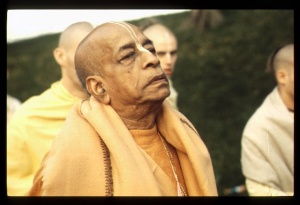SB 4.23.28

A.C. Bhaktivedanta Swami Prabhupada
TEXT 28
- sa vañcito batātma-dhruk
- kṛcchreṇa mahatā bhuvi
- labdhvāpavargyaṁ mānuṣyaṁ
- viṣayeṣu viṣajjate
SYNONYMS
saḥ — he; vañcitaḥ — cheated; bata — certainly; ātma-dhruk — envious of himself; kṛcchreṇa — with great difficulty; mahatā — by great activities; bhuvi — in this world; labdhvā — by achieving; āpavargyam — the path of liberation; mānuṣyam — in the human form of life; viṣayeṣu — in the matter of sense gratification; viṣajjate — becomes engaged.
TRANSLATION
Any person who engages himself within this material world in performing activities that necessitate great struggle, and who, after obtaining a human form of life—which is a chance to attain liberation from miseries—undertakes the difficult tasks of fruitive activities, must be considered to be cheated and envious of his own self.
PURPORT
In this material world people are engaged in different activities simply to achieve a little success in sense gratification. The karmīs are engaged in performing very difficult activities, and thus they open gigantic factories, build huge cities, make big scientific discoveries, etc. In other words, they are engaged in performing very costly sacrifices in order to be promoted to the higher planetary systems. Similarly, yogīs are engaged in achieving a similar goal by accepting the tedious practices of mystic yoga. Jñānīs are engaged in philosophical speculation in order to gain release from the clutches of material nature. In these ways everyone is engaged in performing very difficult tasks simply for the gratification of the senses. All of these are considered to be engaged in sense gratificatory activities (or viṣaya) because they all demand some facility for material existence. Actually the results of such activities are temporary. As Kṛṣṇa Himself proclaims in Bhagavad-gītā (BG 7.23), antavat tu phalaṁ teṣām: "The fruits [of those who worship the demigods] are limited and temporary." Thus the fruits of the activities of the yogīs, karmīs and jñānīs are ephemeral. Moreover, Kṛṣṇa says, tad bhavaty alpa-medhasām: "They are simply meant for men of small intelligence." The word viṣaya denotes sense gratification. The karmīs flatly state that they want sense gratification. The yogīs also want sense gratification, but they want it to a higher degree. It is their desire to show some miraculous results through the practice of yoga. Thus they strive very hard to achieve success in becoming smaller than the smallest or greater than the greatest, or in creating a planet like earth or, as scientists, by inventing so many wonderful machines. Similarly, the jñānīs are also engaged in sense gratification, for they are simply interested in becoming one with the Supreme. Thus the aim of all these activities is sense gratification to a higher or a lower degree. The bhaktas, however, are not interested in sense gratificatory practices; they are simply satisfied to get an opportunity to serve the Lord. Although they are satisfied in any condition, there is nothing they cannot obtain, because they are purely engaged in the service of the Lord.
The wives of the demigods condemn the performers of sense gratificatory activities as vañcita, cheated. Those so engaged are actually killing themselves (ātma-hā). As stated in Śrīmad-Bhāgavatam(SB 11.20.17):
- nṛ-deham ādyaṁ sulabhaṁ sudurlabhaṁ
- plavaṁ sukalpaṁ guru-karṇadhāram
- mayānukūlena nabhasvateritaṁ
- pumān bhavābdhiṁ na taret sa ātma-hā
When one wants to cross a large ocean, he requires a strong boat. It is said that this human form of life is a good boat by which one can cross the ocean of nescience. In the human form of life one can obtain the guidance of a good navigator, the spiritual master. One also gets a favorable wind by the mercy of Kṛṣṇa, and that wind is the instructions of Kṛṣṇa. The human body is the boat, the instructions of Lord Kṛṣṇa are the favorable winds, and the spiritual master is the navigator. The spiritual master knows well how to adjust the sails to catch the winds favorably and steer the boat to its destination. If, however, one does not take advantage of this opportunity, one wastes the human form of life. Wasting time and life in this way is the same as committing suicide.
The word labdhvāpavargyam is significant in this verse, because according to Jīva Gosvāmī, āpavargyam, or the path of liberation, does not refer to merging into the impersonal Brahman but to sālokyādi-siddhi, which means attaining the very planet where the Supreme Personality of Godhead resides. There are five kinds of liberation, and one is called sāyujya-mukti, or merging into the existence of the Supreme, or the impersonal Brahman effulgence. However, since there is a chance of one's falling down again into the material sky from the Brahman effulgence, Śrīla Jīva Gosvāmī advises that in this human form of life one's only aim should be to go back home, back to Godhead. The words sa vañcitaḥ indicate that once a person has obtained the human form of life, he is actually cheated if he does not make preparations to go back home, back to Godhead. The position of all nondevotees, who are not interested in going back to Godhead, is very much lamentable, for the human form of life is meant for executing devotional service and nothing else.